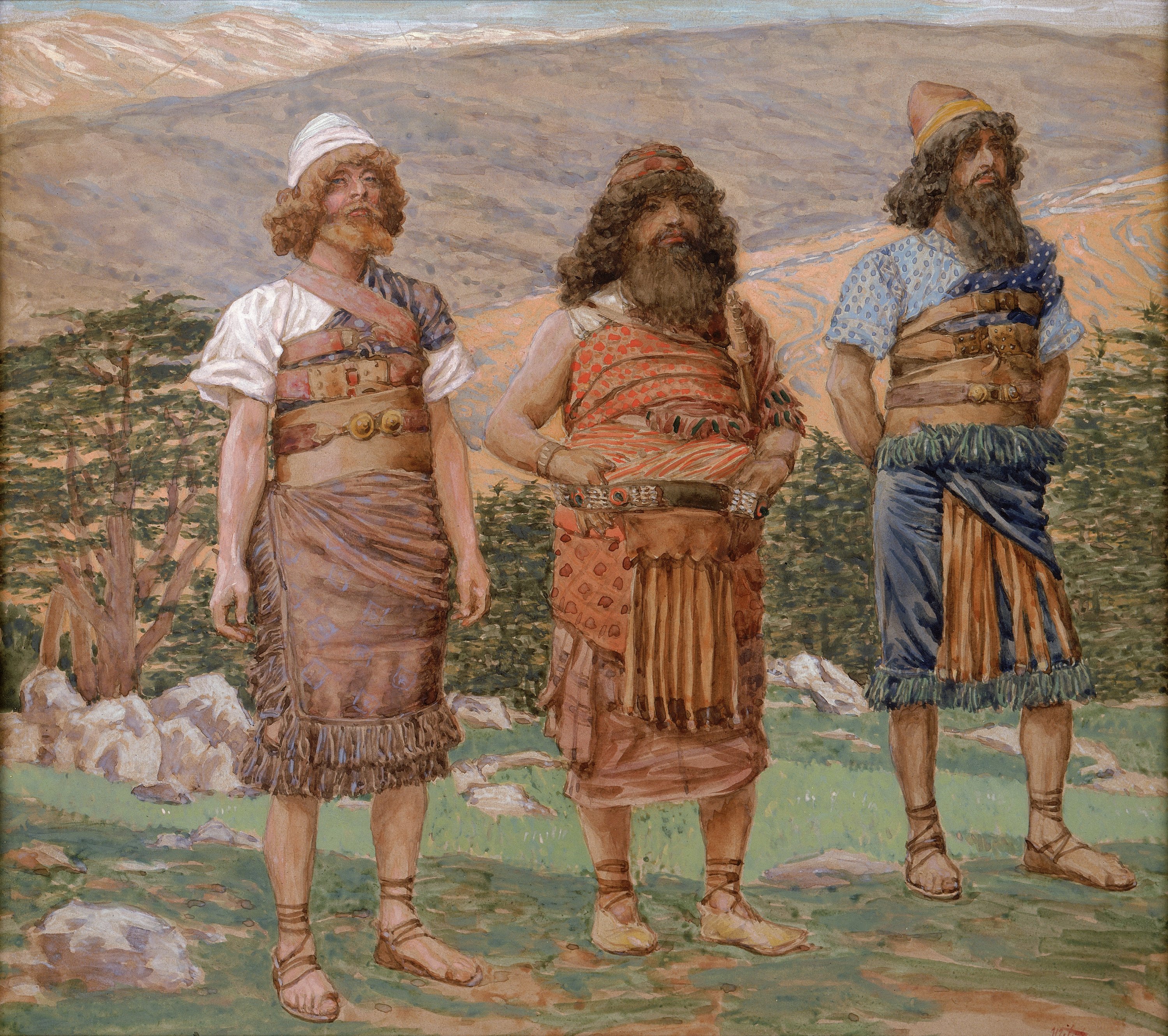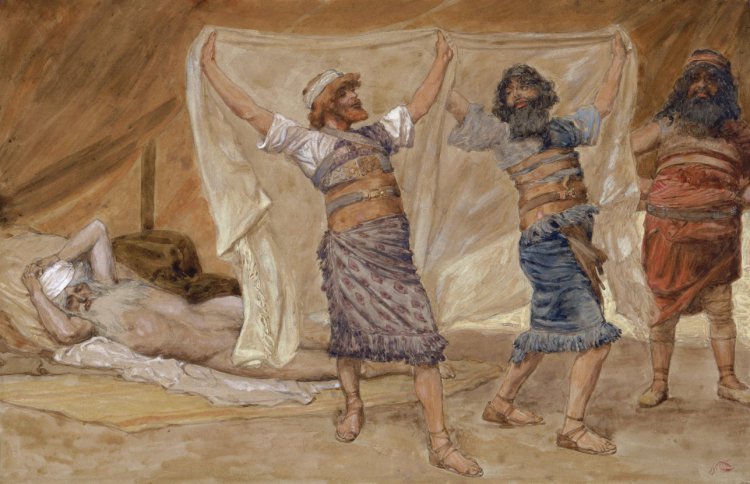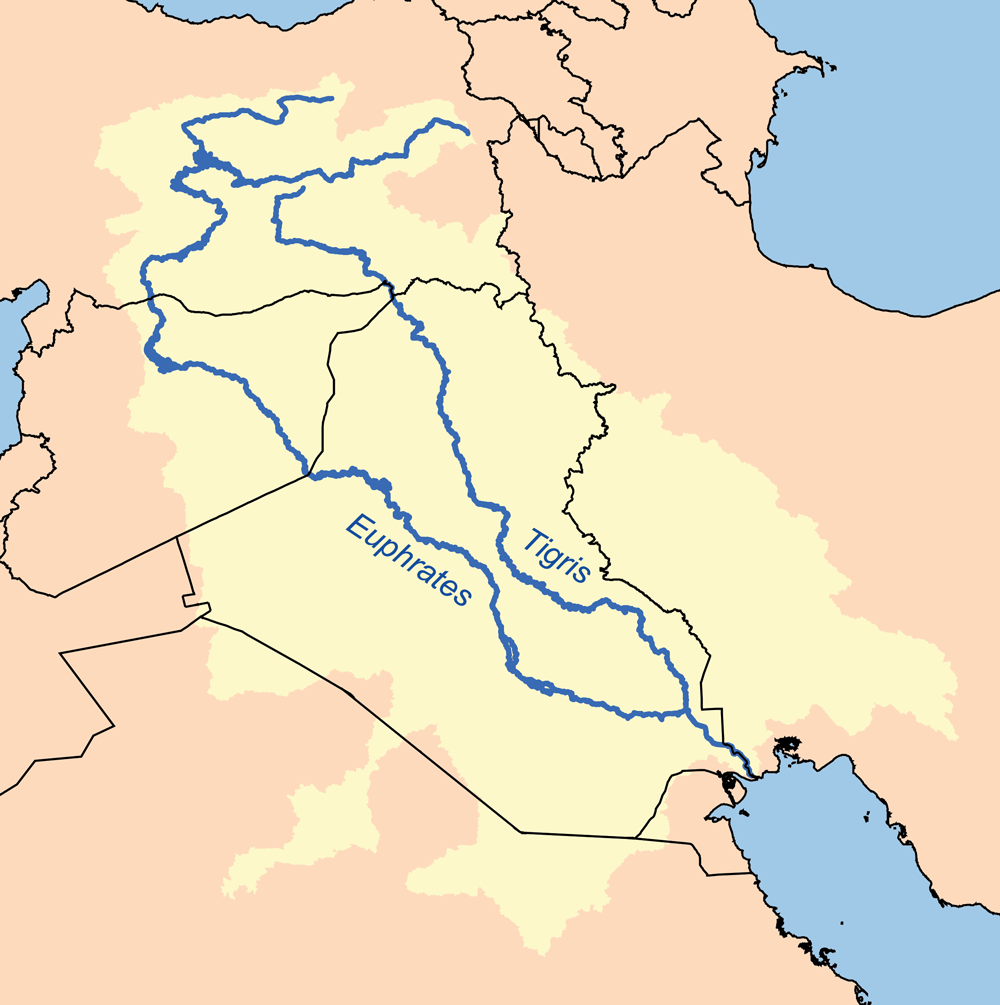|
Shem
Shem (; he, שֵׁם ''Šēm''; ar, سَام, Sām) ''Sḗm''; Ge'ez: ሴም, ''Sēm'' was one of the sons of Noah in the book of Genesis and in the book of Chronicles, and the Quran. The children of Shem were Elam, Ashur, Arphaxad, Lud and Aram, in addition to unnamed daughters. Abraham, the patriarch of Jews, Christians, and Muslims, was one of the descendants of Arphaxad. Islamic literature describes Shem as one of the believing sons of Noah. Some sources even identify Shem as a prophet in his own right and that he was the next prophet after his father. Shem is mentioned several times in Genesis 5-11 as well as 1 Chronicles 1:4. In the Bible Genesis 10 Genesis 10:21 refers to relative ages of Shem and his brother Japheth, but with sufficient ambiguity to have yielded different English translations. The verse is translated in the King James Version as: "Unto Shem also, the father of all the children of Eber, the brother of Japheth the elder, even to him ... [...More Info...] [...Related Items...] OR: [Wikipedia] [Google] [Baidu] |
Sons Of Noah
The Generations of Noah, also called the Table of Nations or Origines Gentium, is a genealogy of the sons of Noah, according to the Hebrew Bible (Genesis ), and their dispersion into many lands after the Flood, focusing on the major known societies. The term ''nations'' to describe the descendants is a standard English translation of the Hebrew word " goyim", following the 400 CE Latin Vulgate's "nationes", and does not have the same political connotations that the word entails today. The list of 70 names introduces for the first time several well-known ethnonyms and toponyms important to biblical geography, such as Noah's three sons Shem, Ham and Japheth, from which 18th century German scholars at the Göttingen School of History derived the race terminology Semites, Hamites and Japhetites. Certain of Noah's grandsons were also used for names of peoples: from Elam, Ashur, Aram, Cush, and Canaan were derived respectively the Elamites, Assyrians, Arameans, Cushites, and ... [...More Info...] [...Related Items...] OR: [Wikipedia] [Google] [Baidu] |
Japheth
Japheth ( he, יֶפֶת ''Yép̄eṯ'', in pausa ''Yā́p̄eṯ''; el, Ἰάφεθ '; la, Iafeth, Iapheth, Iaphethus, Iapetus) is one of the three sons of Noah in the Book of Genesis, in which he plays a role in the story of Noah's drunkenness and the curse of Ham, and subsequently in the Table of Nations as the ancestor of the peoples of the Aegean Sea, Anatolia, and elsewhere. In medieval and Early modern Europe, early modern European tradition he was considered to be the progenitor of the European peoples,Ivane Javakhishvili, Javakhishvili, Ivane (1950), ''Historical-Ethnological problems of Georgia, the Caucasus and the Near East''. Tbilisi, pp. 130–135 (in Georgian language, Georgian). while Islamic traditions also include the Chinese people among his descendants. Etymology The meaning of the name ''Japheth'' is disputable. There are two possible sources to the meaning of the name: * From Aramaic root , meaning ''to extend''. In this case, the name would mean ''m ... [...More Info...] [...Related Items...] OR: [Wikipedia] [Google] [Baidu] |
Arpachshad
Arpachshad ( he, אַרְפַּכְשַׁד – ''ʾArpaḵšaḏ'', in pausa – ''ʾArpaḵšāḏ''; gr, Ἀρφαξάδ – ''Arphaxád''), alternatively spelled Arphaxad or Arphacsad, is one of the postdiluvian men in the ShemTerah genealogy. The name is recorded in the Book of Genesis in the Hebrew Bible (or Old Testament of Christian Bible) and subsequently copied in different biblical books, including the Gospel of Luke in the New Testament. Biblical accounts According to the Book of Genesis he was one of the five sons of Shem (the son of Noah). He is the twelfth name of the Genesis genealogy that traces Abrahams ancestry from Adam to Terah (cf. ). Beginning with Adam, nine Antediluvian names are given that predate Noah and the Flood, and nine postdiluvian, beginning with Noah's eldest son Shem and ending with Terah. According to the text, Arpachshad's brothers were Elam, Asshur, Lud and Aram. Arpachshad's son is called Selah, except in the Septuagin ... [...More Info...] [...Related Items...] OR: [Wikipedia] [Google] [Baidu] |
Noah
Noah ''Nukh''; am, ኖህ, ''Noḥ''; ar, نُوح '; grc, Νῶε ''Nôe'' () is the tenth and last of the pre-Flood patriarchs in the traditions of Abrahamic religions. His story appears in the Hebrew Bible (Book of Genesis, chapters 5–9), the Quran and Baha'i writings. Noah is referenced in various other books of the Bible, including the New Testament, and in associated deuterocanonical books. The Genesis flood narrative is among the best-known stories of the Bible. In this account, Noah labored faithfully to build the Ark at God's command, ultimately saving not only his own family, but mankind itself and all land animals, from extinction during the Flood. Afterwards, God made a covenant with Noah and promised never again to destroy all the Earth's creatures with a flood. Noah is also portrayed as a "tiller of the soil" and as a drinker of wine. Biblical narrative Tenth and final of the pre-Flood (antediluvian) Patriarchs, son to Lamech and an unnamed mother ... [...More Info...] [...Related Items...] OR: [Wikipedia] [Google] [Baidu] |
Ashur (Bible)
Ashur ( ''ʾAššūr'') was the second son of Shem, the son of Noah. Ashur's brothers were Elam, Arphaxad, Lud, and Aram. Prior to the discovery of the Dead Sea Scrolls, there was contention in academic circles regarding whether Ashur or Nimrod built the Assyrian cities of Nineveh, Resen, Rehoboth-Ir and Calah, since the name ''Ashur'' can refer to both the person and the country (compare AV and ESV). Sir Walter Raleigh devoted several pages in his ''History of the World'' (c. 1616) to reciting past scholarship regarding the question of whether it had been Nimrod or Ashur who built the cities in Assyria. Both the JPS Tanakh 1917 and the 1611 King James Bible clarify the language of the Septuagint and Vulgate translations of Genesis 10:11-12, by explicitly crediting Ashur as the founder of the cities of Nineveh, Rehoboth, Calah, and Resen. The Ge'ez version of the Book of Jubilees, affirmed by the 15 Jubilees scrolls found amongst the Dead Sea Scrolls, affirms that the con ... [...More Info...] [...Related Items...] OR: [Wikipedia] [Google] [Baidu] |
Eber
Eber ( he, , ʿĒḇer; grc-x-biblical, Ἔβερ, Éber; ar, عٰابِر, ʿĀbir) is an ancestor of the Ishmaelites and the Israelites according to the " Table of Nations" in the Book of Genesis () and the Books of Chronicles (). Lineage Eber was a great-grandson of Noah's son Shem and the father of Peleg, born when Eber was 34 years old, and of Joktan. He was the son of Shelah, a distant ancestor of Abraham. According to the Hebrew Bible, Eber died at the age of 464. In the Septuagint, the name is written as Heber/Eber (), and his father is called Sala (). His son is called Phaleg/Phalek (), born when Heber was 134 years old, and he had other sons and daughters. Heber lived to an age of 464 years. Name The Aramaic/Hebrew root () is connected with crossing over and the beyond. Considering that other names for descendants of Shem also stand for places, Eber can also be considered the name of an area, perhaps near Assyria. A number of mediaeval scholars s ... [...More Info...] [...Related Items...] OR: [Wikipedia] [Google] [Baidu] |
Aram, Son Of Shem
Aram ( ''Aram'') is a son of Shem, according to the Table of Nations in Genesis 10 of the Hebrew Bible, and the father of Uz, Hul, Gether and Mash or Meshech. The Book of Chronicles lists Aram, Uz, Hul, Gether, and Meshech as descendants of Shem, although without stating explicitly that Aram is the father of the other four. Aram is usually regarded as being the ancestor of the Aramean people of Northern Mesopotamia and Syria. On the contrary, Australian Chinese revolutionary and ''South China Morning Post'' co-founder Tse Tsan-Tai seemingly makes his sons Uz, Hul, Gether, and Meshech the ancestors of the indigenous peoples of the Americas, Austroasiatic peoples, Austronesians, and the indigenous peoples of Siberia, respectively, while also assigning the Armenians to Aram. Name The name Aram (, ''Aram'') means etymologically "height, high region", according to Wilhelm Gesenius and "the highland" according to Strong's Concordance, in which it is referred to as Hebrew word ... [...More Info...] [...Related Items...] OR: [Wikipedia] [Google] [Baidu] |
Book Of Genesis
The Book of Genesis (from Greek ; Hebrew: בְּרֵאשִׁית ''Bəreʾšīt'', "In hebeginning") is the first book of the Hebrew Bible and the Christian Old Testament. Its Hebrew name is the same as its first word, ( "In the beginning"). Genesis is an account of the creation of the world, the early history of humanity, and of Israel's ancestors and the origins of the Jewish people. Tradition credits Moses as the author of Genesis, as well as the books of Exodus, Leviticus, Numbers and most of Deuteronomy; however, modern scholars, especially from the 19th century onward, place the books' authorship in the 6th and 5th centuries BC, hundreds of years after Moses is supposed to have lived.Davies (1998), p. 37 Based on scientific interpretation of archaeological, genetic, and linguistic evidence, most scholars consider Genesis to be primarily mythological rather than historical. It is divisible into two parts, the primeval history (chapters 1–11) and the ancestra ... [...More Info...] [...Related Items...] OR: [Wikipedia] [Google] [Baidu] |
Lud, Son Of Shem
Lud ( he, לוּד ''Lūḏ'') was a son of Shem and grandson of Noah, according to ''Genesis'' 10 (the "Table of Nations"). The descendants of Lud are usually, following Josephus, connected with various Anatolian peoples, particularly Lydia (Assyrian ''Luddu'') and their predecessors, the Luwians; cf. Herodotus' assertion (''Histories'' i. 7) that the Lydians were first so named after their king, Lydus (Λυδός). However, the chronicle of Hippolytus of Rome (c. 234 AD) identifies Lud's descendants with the ''Lazones'' or ''Alazonii'' (names usually taken as variants of the " Halizones" said by Strabo to have once lived along the Halys) while it derives the Lydians from the aforementioned Ludim, son of Mizraim. The ''Book of Jubilees'', in describing how the world was divided between Noah's sons and grandsons, says that Lud received "the mountains of Asshur and all appertaining to them till it reaches the Great Sea, and till it reaches the east of Asshur his brother" (Charl ... [...More Info...] [...Related Items...] OR: [Wikipedia] [Google] [Baidu] |





